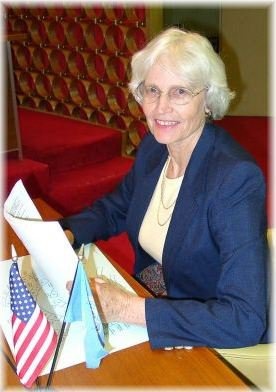Progressive NC lawmaker resigns over restrictive voting law

North Carolina Sen. Ellie Kinnaird announced this week that she was stepping down from the legislature after nine terms -- and the Orange County Democrat and outspoken progressive leader blamed the legislature's hard turn to the right.
"What led me to this decision are the actions taken by the Republican majority in the legislature that [have] been a shocking reversal of the many progressive measures that I and many others have worked so hard to enact: measures that over the years had made North Carolina a model of moderate-to-progressive, pro-business but also pro-people public policy in the South," Kinnaird, 81, wrote in an announcement posted to her Facebook page.
The action that clinched Kinnaird's decision to give up her state Senate seat was the passage of the Voter Information Verification Act (VIVA), one of the nation's most restrictive voting laws.
"It's a very severe problem, and that's why I left," Kinnaird told Facing South.
In 2005, Kinnaird sponsored a bill that became law requiring paper trail audits from voting machines for election results as a way of tracking fraud and other possible ballot manipulation. But under VIVA, all voters will have to vote using paper ballots instead of electronic voter machines. Kinnaird calls that "off-the-wall crazy."
"They are very labor-intensive and time-consuming," said Kinnaird of paper ballots. "It will cost counties more money, especially when they already have machines that produce paper records. For them to say that's a problem is ridiculous."
VIVA also imposes onerous new restrictions on voters. Most notorious among those is a requirement that every voter show one of a small list of eligible photo identification cards in order to cast a ballot. Kinnaird was one of the more vocal opponents of the law, which passed without any Democratic votes. Kinnaird said the law will primarily hurt African-American, low-income and student voters.
Kinnaird will now work on a grassroots project to help churches, fraternities, sororities and other groups help people obtain the IDs necessary to vote. It will not be a nonprofit, said Kinnaird, but a community-based operation that, for example, could provide resources for a black church to have its members canvass their neighborhoods for those who lack proper ID and then assist them with getting one.
Kinnaird does not see the effort as a capitulation to Republicans' voter ID agenda, which she called "immoral" in her resignation announcement. Rather, it's an acknowledgement that -- absent a court injunction or repeal of the law -- there are thousands of citizens who will need help obtaining ID so they won’t be disenfranchised. Over 318,000 North Carolinians appear to lack state-issued photo ID. A third of them are African Americans, and many are senior citizens.
Kinnaird said she wants to "make sure that we do everything we can do to make sure every person who wants to vote can vote.”
Similar voter assistance efforts have been launched in other states where photo ID laws passed. The Pennsylvania Voter ID Coalition was created after Republicans passed a strict voter ID law, which is currently on pause due to a court injunction. Still, the coalition’s members are trying to help as many of the 900,000 to 1.2 million Pennsylvanians who lack ID as possible in case the law goes back into effect.
Also aiming to counter the impacts of voter ID laws is a new venture from American Values First, a 501(c)(4) outside group connected to the Democratic Legislative Campaign Committee. It will push for state laws to ease access to the ballot, and it is targeting states like North Carolina that have passed restrictive voter bills. One example of legislation it promotes would expand access to mail-in absentee ballots. It also plans to back Democratic candidates.
Following Kinnaird's resignation announcement, scores of people left comments on her Facebook page, and state Rep. Verla Insko (D-Orange) called her “the conscience of the General Assembly.” Even some of Kinnaird's political opponents sang her praises.
“You have been wrong on every major policy area," said Vernon Robinson, a conservative former city council member for Winston-Salem, "but I salute you as an effective adversary."
